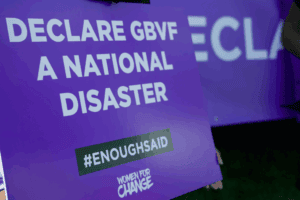The South African private sector has not yet fully embraced the role it needs to play in the achievement of gender equality.

Due to the prevalence of GBV in South Africa, the World Health Organization (WHO) estimates that the human capital loss (combining the cost across all age groups) was almost at $2.9 billion. Human capital loss refers to damage or loss caused to people or societies, including material loss, social costs, and psychological damage.
This is according to a report from the University of Johannesburg in collaboration with Tiekie Barnard, CEO and Founder of Shared Value Africa Initiative, the #ITSNOTOK movement and KPMG South Africa.
Researchers have estimated that judicial costs for GBV was R104 million in 2019. Considering the out-of-pocket medical costs for the GBV victims (almost R10 billion), human capital loss (R26 billion) and judicial costs (R104 million), experts conservatively estimated that South Africa has lost more than R36 billion in 2019 alone, due to GBV. This is based on the country’s estimated 0.7% loss of 2019 GDP due to GBV induced human capital loss.
ALSO READ: GBV ‘continues to rise’ in SA
For this reason, the Shared Value Africa Initiative together with the #ITSNOTOK movement has recently tried to impose the notion that GBV prevention requires a policy-driven, holistic approach using evidence-based interventions, involving all relevant sectors.
“The South African private sector has not yet fully embraced the role it needs to play in the achievement of gender equality,” the report read.
This was discovered after interviewing 73 company CEOs, executive directors and leadership, as well as collating written responses to an online survey questionnaire completed by 2 270 employees, when the researchers found that GBV is not strategically addressed.
“At present, the topic of GBV does not feature in corporate social responsibility or BBBEE indices, corporate governance specifications, or even occupational health and safety regulations,” the experts said.
Companies were urged to take effective and decisive action to assess, prevent, respond to, and monitor GBV in the formal workplace.
NOW READ: The issue of GBV is destroying lives
“It is important to act in a thoughtful and considered way. Rushed and ill-informed approaches to tackling GBV could exacerbate risks and cause further harm to survivors, especially if support services are not in place.
“It is equally important to underline that there is no one-size-fits-all approach to addressing GBV. Efforts to prevent GBV, and to respond to reports, need to be context-appropriate and may need to be adapted to company size, operating environment, or type of work,” the report concluded.
Support Local Journalism
Add The Citizen as a Preferred Source on Google and follow us on Google News to see more of our trusted reporting in Google News and Top Stories.






